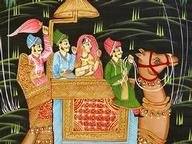Quiz Answer Key and Fun Facts
1. The Boy Bathing:
"A boy bathing in a river was in danger of being drowned. He called out to a passing traveller for help, but instead of holding out a helping hand, the man stood by unconcernedly, and scolded the boy for his imprudence.
"Oh, sir!" cried the youth, "pray help me now and scold me afterwards.""
What lesson did the needy boy learn?
2. The Donkey and his Buyer:
"A man wished to buy a donkey, and agreed with its owner that he should try out the animal before he bought him. He took the donkey home and led it to the manger to mix with his other donkeys. Very quickly the new animal turned his back on the others and joined the one that was most idle and the greatest eater of them all. Seeing this, the man put a halter on him and led him back to his owner.
On being asked how he could have given it a fair trial in so short a time, he answered,
"I don't need a trial. I feel certain that he'll be like the one he chose for his companion.""
What lesson do we take from this?
3. The Widow and the Sheep:
"A certain poor widow had one single sheep. At shearing time, wishing to take his fleece and to avoid expense, she sheared him herself, but used the shears so unskilfully that with the fleece she sheared the flesh.
The sheep, writhing with pain, said,
'Why do you hurt me so, mistress? What weight can my blood add to the wool? If you want my flesh, there is the butcher, who will kill me in an instant; but if you want my fleece and wool, there is the shearer, who will shear and not hurt me.'"
What did both the sheep and the widow learn?
4. The Two Frogs:
"Two frogs dwelt in the same pool. When the pool dried up under the summer's heat, they left it and set out together for another home. As they went along they chanced to pass a deep well, amply supplied with water, and when they saw it, one of the frogs said to the other, "Let us descend and make our abode in this well: it will furnish us with shelter and food."
The other replied with greater caution, "But suppose the water should fail us. How can we get out again from so great a depth?""
What wisdom did the second frog show?
5. The Crab and the Fox:
"A crab, forsaking the seashore, chose a neighbouring green meadow as its feeding ground. A fox came across him, and being very hungry ate him up. Just as he was on the point of being eaten, the crab said,
"I well deserve my fate, for what business had I on the land, when by my nature and habits I am only adapted for the sea?""
What lesson might have saved the crab's life?
6. The Gnat and the Bull:
"A gnat settled on the horn of a bull, and sat there a long time. Just as he was about to fly off, he made a buzzing noise, and asked of the bull if he would like him to go.
The bull replied, 'I did not know you had come, and I shall not miss you when you go away.'"
What did the gnat learn from this?
7. The Thirsty Pigeon:
"A pigeon, oppressed by excessive thirst, saw a goblet of water painted on a signboard. Not supposing it to be only a picture, she flew towards it with a loud whir and unwittingly dashed against the signboard, jarring herself terribly. Having broken her wings by the blow, she fell to the ground, and was caught by one of the bystanders."
What lesson did the pigeon demonstrate?
8. The Wild Boar and the Fox:
"A wild boar stood under a tree and rubbed his tusks against the trunk. A fox passing by asked him why he thus sharpened his teeth when there was no danger threatening from either huntsman or hound. He replied,
'I do it advisedly; for it would never do to have to sharpen my weapons just at the time I ought to be using them.'"
What did the wild boar mean?
9. The Wolf in Sheep's Clothing:
"Once upon a time a wolf resolved to disguise his appearance in order to secure food more easily. Encased in the skin of a sheep, he pastured with the flock deceiving the shepherd by his costume. In the evening he was shut up by the shepherd in the fold; the gate was closed, and the entrance made thoroughly secure. But the shepherd, returning to the fold during the night to get meat for the next day, mistakenly caught up the wolf instead of a sheep, and killed him instantly."
What did the wolf learn, posthumously?
10. The Ill Lion:
"A lion, unable from old age and infirmities to provide himself with food by force, resolved to do so by artifice. He returned to his den, and lying down there, pretended to be sick, taking care that his sickness should be publicly known. The beasts expressed their sorrow, and came one by one to his den, where the lion devoured them. After many of the beasts had thus disappeared, the fox discovered the trick and presenting himself to the lion, stood on the outside of the cave, at a respectful distance, and asked him how he was.
"I am very middling," replied the lion, "but why do you stand without? Pray enter within to talk with me."
"No, thank you," said the fox. "I notice that there are many prints of feet entering your cave, but I see no trace of any returning.""
What did the fox demonstrate?
Source: Author
reedy
This quiz was reviewed by FunTrivia editor
looney_tunes before going online.
Any errors found in FunTrivia content are routinely corrected through our feedback system.

